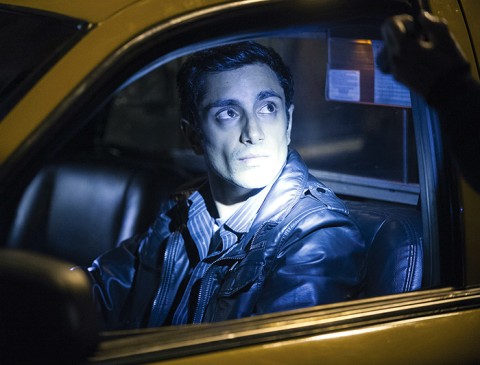The Night Of and the nights after
On HBO's new series, a young Muslim is accused of murder. But whether he's guilty isn't the point.

In the first episode of HBO’s new series The Night Of, a young Pakistani-American man wakes up in bed next to a dead woman. Until this point, Nasir Khan (Riz Ahmed), called Naz by friends and family, was a good kid, a college student who worked hard and tried to do right by his immigrant family. But on the night in question, he sneaks out of the house and takes his dad’s taxi to go to a party in Manhattan. He never makes it there. Instead, he meets a young woman, indulges in drugs, and spends the night with her. The next morning she is covered with stab wounds. Naz can’t remember what happened and flees the scene. Soon the police pick him up and charge him with murder.
The first episode is a painful series of events. Naz is stupid but not evil, and the show effectively creates viewer sympathy for him. I found myself murmuring, “Please don’t steal your dad’s cab. . . . Don’t go off with the girl. . . . Don’t take the drugs.” After Naz runs away from the scene, his actions cascade into numerous other situations to avoid if you don’t want to be falsely convicted of murder.
The sympathy created for Naz presumes his innocence, but The Night Of is about moral ambiguity; we viewers aren’t allowed to settle into our desire for Naz’s absolution. The script provides plenty of other possible suspects, but it doesn’t close the door on Naz’s possible guilt, not even for himself.
Yet The Night Of isn’t only an investigation into Naz’s possible guilt. It also explores the far-reaching effects of the criminal justice system’s involvement. The process affects not only Naz, but his family and his community.
After the first episode, the series is about Naz’s imprisonment and trial. HBO’s promotional materials for the show describe this as a purgatory. Naz is in limbo as forces beyond his control swirl around him, deciding his fate. But this is no purgatory, because purgatory is about redemption. In the medieval church, purgatory was imagined as a place where souls went to confront their sin so that they could enter the kingdom of God purified. Pope Benedict XVI has spoken about purgatory as the refining fires of Jesus’ love, while Protestants have long envisioned deathbed sanctification taking the place of purgatory. In each case there is still a means by which one might be saved. Naz’s prison is no purgatory. He has no hope of salvation. He has entered hell, not purgatory.
The show does a dark and brilliant job of portraying that hell. The viewer is caught up in Naz’s hopelessness. He does not know whom to trust. Even if he’s innocent of the murder, prison will make him into a criminal. He chooses to do horrible things to get the protection he needs to survive. Meanwhile the world outside the prison condemns him on the basis of race and punishes other young men who look like him or are, like him, Muslim. His parents can’t meet the economic demands of his legal defense and lose their livelihoods and their ties to the community as they try to help their son. The criminal justice system seems intent on condemning him. Even if Naz is innocent, even if he is acquitted, there is no salvation here.
A version of this article appears in the November 9 print edition under the title “Episodes in hell.”





